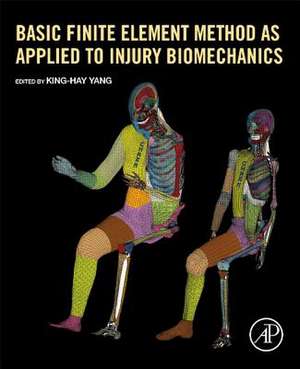Basic Finite Element Method as Applied to Injury Biomechanics
Autor King-Hay Yangen Limba Engleză Paperback – 19 sep 2017
In addition, the book focuses on how to apply material properties and loading conditions to the model, how to arrange the information in the order of head, neck, upper torso and upper extremity, lower torso and pelvis and lower extremity. The book covers scaling from one body size to the other, parametric modeling and joint positioning, and is an ideal text for teaching, further reading and for its unique application to injury biomechanics.
With over 25 years of experience of developing finite element models, the author's experience with tissue level injury threshold instead of external loading conditions provides a guide to the "do’s and dont's" of using finite element method to study injury biomechanics.
- Covers the fundamentals and applications of the finite element method in injury biomechanics
- Teaches readers model development through a hands-on approach that is ideal for students and researchers
- Includes different modeling schemes used to model different parts of the body, including related constitutive laws and associated material properties
Preț: 733.77 lei
Preț vechi: 909.97 lei
-19% Nou
Puncte Express: 1101
Preț estimativ în valută:
140.41€ • 150.14$ • 117.07£
140.41€ • 150.14$ • 117.07£
Carte tipărită la comandă
Livrare economică 11-25 aprilie
Preluare comenzi: 021 569.72.76
Specificații
ISBN-13: 9780128098318
ISBN-10: 0128098317
Pagini: 748
Dimensiuni: 191 x 235 x 42 mm
Editura: ELSEVIER SCIENCE
ISBN-10: 0128098317
Pagini: 748
Dimensiuni: 191 x 235 x 42 mm
Editura: ELSEVIER SCIENCE
Public țintă
Biomedical Engineers, Biomechanical Engineers, Graduate Students, Clinicians, R&D Professionals, Mechanical Engineers, Material Scientists.Cuprins
1. Introduction2. Meshing, Element Types, and Element Shape Functions3. Isoparametric Formulation and Mesh Quality4. Element Stiffness Matrix5. Material Laws and Properties6. Boundary and loading conditions7. Stepping through finite element analysis8. Modal and Transient Dynamic Solutions9. Biological Components Modeling10. Parametric Modeling11. Modeling passive and active muscle12. Modeling the Head13. Modeling the Neck14. Modeling the Upper Torso and Upper Extremity15. Modeling the Lower Torso16. Modeling the Lower Extremity17. Modeling Vulnerable subjects18. Fundamentals of Blast Modeling
